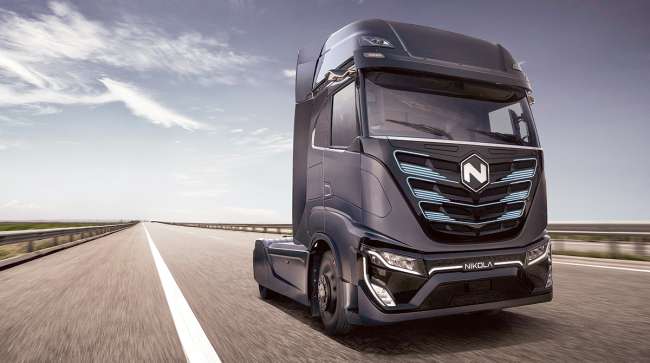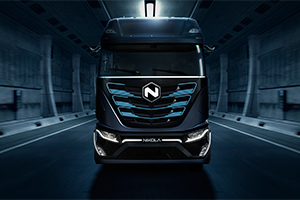Senior Reporter
Nikola Misses Estimates, Details Additional SEC Inquiry

[Stay on top of transportation news: Get TTNews in your inbox.]
Nikola Corp. posted a widened first-quarter loss as the zero-emission vehicle startup continues to develop its battery-electric and fuel-cell electric trucks.
The company on May 7 reported a Q1 net loss of $120.2 million, or negative 31 cents per share, compared with a net loss of $33.1 million, negative 12 cents per share, in the year-ago period. The company reported no revenue, as it has yet to begin retail sales of its vehicles.
Analysts were expecting a loss of 27 cents per share.
The Phoenix-based company ended the quarter with $763 million in cash, compared with $79.6 million last year.
In a statement, Nikola said it is nearing completion of the second round of battery-powered prototype vehicles, and has begun building a fuel-cell test vehicle at its headquarters in Arizona.
“During the first quarter Nikola continued to deliver on our previously communicated milestones and execute on our business plan,” CEO Mark Russell said. “We have had continued success in commissioning and validating the Nikola Tre BEVs, and are nearing completion of both our Ulm, Germany, and Coolidge, Ariz., manufacturing facilities.”
Nikola on May 6 announced it had signed a letter of intent with port trucking firm Total Transportation Services Inc. for testing and possible order of 100 vehicles. TTSI operates trucks at the ports of Long Beach and Los Angeles in Southern California and said 13,000 to 14,000 trucks come through the facilities each month, emitting an estimated 2,600 tons per year of nitrogen-oxide emissions.
“The Nikola Tre trucks are exactly the type of zero-emission solution we need to be using at the port,” TTSI President Vic La Rosa said when the announcement was made. “Our trucks operate for 18-20 hours a day making the benefits of the Nikola portfolio a perfect match for our needs. The expected availability of the BEV aligns with our desire to reach our sustainability goals quickly and the FCEV is ideal for longer-range applications. Nikola’s value proposition of the truck and hydrogen fuel bundled together made this partnership even more appealing to our leadership team.”
Nikola is head down and driving forward. Read about today’s latest announcement: https://t.co/ch1apXWukb — Nikola Motor Company (@nikolamotor) May 6, 2021
Thirty of the vehicles for TTSI are expected to be BEVs and the other 70 are set to be fuel-cell electrics. The transaction is expected to be completed by 2023.
Russell in February said the company intends to deliver 50 to 100 of its Nikola Tre Class 8 battery-electric trucks this year, generating projected revenue of $15 million to $30 million.
Nikola officials also provided an update on Q1 construction progress for the Coolidge facility.
“The facility’s really starting to take form now that the building has been substantially enclosed,” Russell said. “The floor slab, the roofing, the walls are complete, electrical and mechanical construction and installation is nearing completion and the manufacturing equipment is beginning to be installed.”
Nikola said production of short-range fuel cell trucks is expected to begin there in the second half of 2023, and production of long-range vehicles will begin the next year.
Russell said he is watching closely the worldwide shortage of semiconductors, computer chips and other supplies and how they might impact future production, but noted that Nikola is on track for its current goals.
“We are going to receive enough cells to complete enough trucks to stick with our current guidance of between 50 and 100 units that we’ll be able to finish this calendar year,” Russell said. “We are looking, of course, for chips, touch screens; there are potential shortages of a number of different parts at this point. I think all of you who follow up companies in the space know that the supply chain is under strain for a number of parts.”
Nikola also continues to contend with allegations that it may have misled investors about its technology. An investigation is underway at the Securities and Exchange Commission, and the company confirmed in a May 3 regulatory filing that it had received subpoenas on March 24 from the Department of Justice and SEC concerning how it plans to use funds it acquired through capital raises this year, as well as its 2021 projected cash flow.
The company said it is committed to fully complying with all of the ongoing investigations. Nikola also disclosed it has paid $3 million in legal fees during the first quarter for its founder and former executive chairman Trevor Milton, who resigned in September just weeks after the allegations were leveled against the company. The payments were made under the terms of an indemnification agreement.
On April 22 Nikola and TravelCenters of America announced a collaboration for installation of hydrogen fueling stations for heavy-duty trucks at two existing TA-Petro sites. The first two stations will be constructed at existing TA-Petro locations in California. They are targeted to be commercially operational by Q1 2023.
Want more news? Listen to today's daily briefing below or go here for more info:





